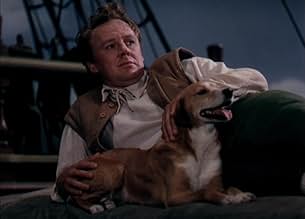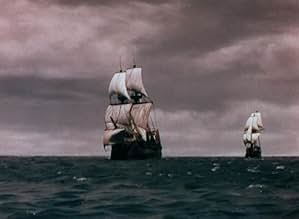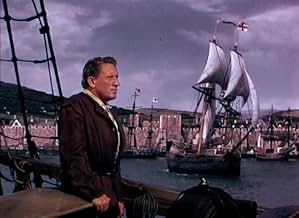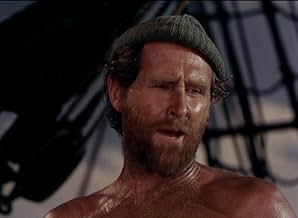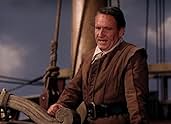En el siglo XVII, el Mayflower, un barco lleno de puritanos que escapaban de la persecución religiosa de que eran objeto en Inglaterra, arribó a la costa atlántica de América del Norte, dond... Leer todoEn el siglo XVII, el Mayflower, un barco lleno de puritanos que escapaban de la persecución religiosa de que eran objeto en Inglaterra, arribó a la costa atlántica de América del Norte, donde fundaron las colonias de Nueva Inglaterra.En el siglo XVII, el Mayflower, un barco lleno de puritanos que escapaban de la persecución religiosa de que eran objeto en Inglaterra, arribó a la costa atlántica de América del Norte, donde fundaron las colonias de Nueva Inglaterra.
- Dirección
- Guionistas
- Elenco
- Ganó 1 premio Óscar
- 1 premio ganado en total
- Salterne
- (sin créditos)
- Child on Mayflower
- (sin créditos)
- Sailor
- (sin créditos)
- Gov. John Carver
- (sin créditos)
- Sailor
- (sin créditos)
- Ellen Moore
- (sin créditos)
- Dirección
- Guionistas
- Todo el elenco y el equipo
- Producción, taquilla y más en IMDbPro
Opiniones destacadas
The production spent a lot of money and it shows on the screen. It did win the Oscar for Best Special Effects. Like always with historical dramas, accuracy is suspect. Everything else is a bit middling. This has great actors, but they can't do more than on the page. It feels a bit scattered as the story follows many characters. It's a bit old school with veteran director Clarence Brown and it turns out to be his last. There may not be enough drama to do a movie about the voyage and the movie does not disprove that fear. The romantic drama feels manufactured. In the end, this has the one Oscar and not much else.
Neither does VAN JOHNSON get more than a brief supporting role as John Alden. LEO GENN gets more material as Tierney's stuffed shirt husband but little can be said of the other passengers except for LLOYD BRIDGES who struts around as a bronzed, blue-eyed pirate with taking ways. He at least livens up the scene whenever he's around.
The main trouble is the lack of strong drama in the script. Most of the passengers are a dull lot. Added to that, the lack of real chemistry between Tracy and Tierney makes it difficult to believe their love could be deep enough for her to care about this rude and cynical man completely lacking any sort of refinement in his nature.
The big storm scene is well realized and staged for maximum effect, but only serves to remind us how dull the other sections of the film are.
Summing up: A very uneven drama about an historical event that celebrated the birth of the New World. Should have been so much better.
Though much was documented - and is adhered to by the plot points - much is conjecture, and this can be subject to dramatic license. Of course, the dialog is up to the screenwriter and director. We can discuss this, but for me, the language and dialog weren't at all problematic, nor was the lush cinematography, in itself (see below).
I have only two quibbles:
I should have preferred to see Plymouth Adventure in black and white. The Pilgirms were a black and white lot who established a black and white society.
I don't mind myth-making, because I think myths can be metaphors for the truths behind them. Of course, myths can be used in malign ways, as we know from the Nazis. Though not malign, the myth of the Pilgrims is of questionable value, since we know that the Pilgrims were seeking, in the New World, freedom, but freedom to establish their own tyranny. This is different from the myth, say, of George Washington and the cherry tree, since Washington was a true archetype of integrity. Nevertheless, rather than making a debunking movie showing the Pilgrims as a kind of proto-Taliban, perhaps it would be better to let their qualities of courage and resourcefulness stand, and leave the myth to benign neglect.
¿Sabías que…?
- TriviaFar from being a womanizer, as depicted in the movie, Captain Christopher Jones was a happily-married family man. He and his wife had eight children, one of whom was born in March, 1621, while Jones was still at the Plymouth Colony in Massachusetts, waiting for favorable weather to return home to England on the "Mayflower."
- ErroresThe viewer who objected to a map of New England in the possession of the Pilgrims on the Mayflower seems unaware that there was a detailed map of New England as a fold-out in Captain John Smith's "Description of New England" (1616), a book referred to by Bradford and owned by Brewster.
- Citas
Offscreen chorus in opening titles: During production, the film's composer, Miklos Rozsa, suggested that the main title feature a musical setting around text from the Ainsworth Psalter, written by English Separatist clergyman Henry Ainsworth, first published in Holland in 1612 and brought to America by the Pilgrims in 1620. The sung lyrics in the version used in the film are
[singing]
Offscreen chorus in opening titles: Confess Jehovah thankfully for He is good, for his Mercie continueth forever. To God of gods confesse do ye because His bountiful mercie continueth forever. Unto the Lord of lords confesse because His merciful kindness continueth forever. To Him that doth, Himself only, things wondrous great, for His Mercie continueth forever; continueth forever.
- Créditos curiososThe end credits are the most comprehensive cast list. After each actor is shown in character, in reverse order from the opening credits, the ship The Mayflower (a replica of the 1620 vessel) is shown floating in the water and identified by a graphic.
- ConexionesFeatured in America at the Movies (1976)
Selecciones populares
- How long is Plymouth Adventure?Con tecnología de Alexa
Detalles
- Fecha de lanzamiento
- País de origen
- Idioma
- También se conoce como
- Plymouth Adventure
- Locaciones de filmación
- Productora
- Ver más créditos de la compañía en IMDbPro
Taquilla
- Presupuesto
- USD 3,185,000 (estimado)
- Tiempo de ejecución
- 1h 45min(105 min)
- Relación de aspecto
- 1.37 : 1


